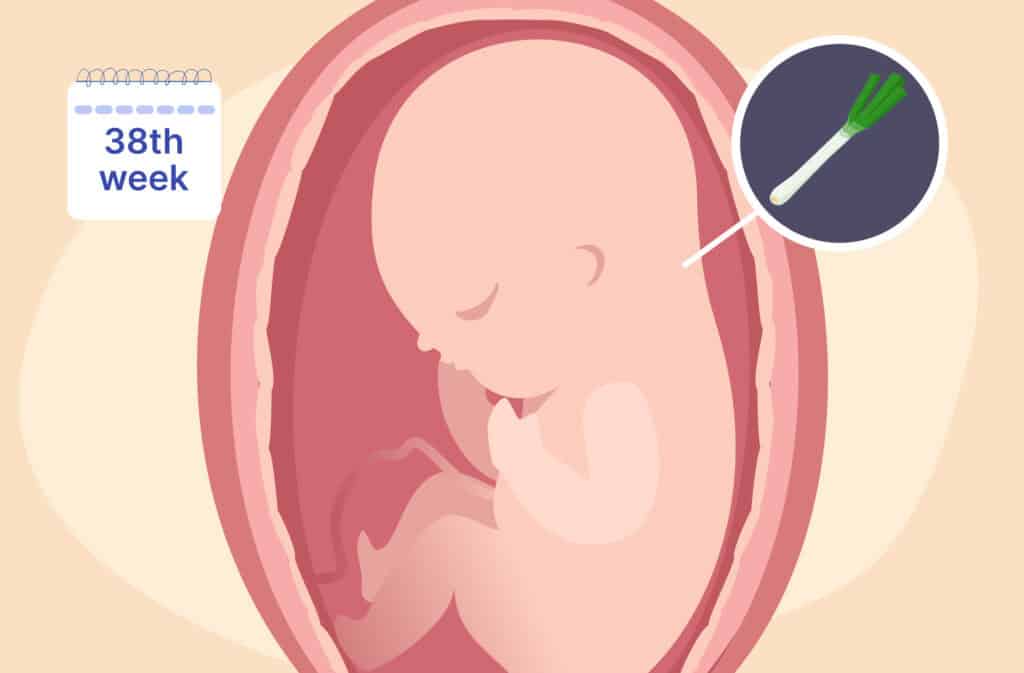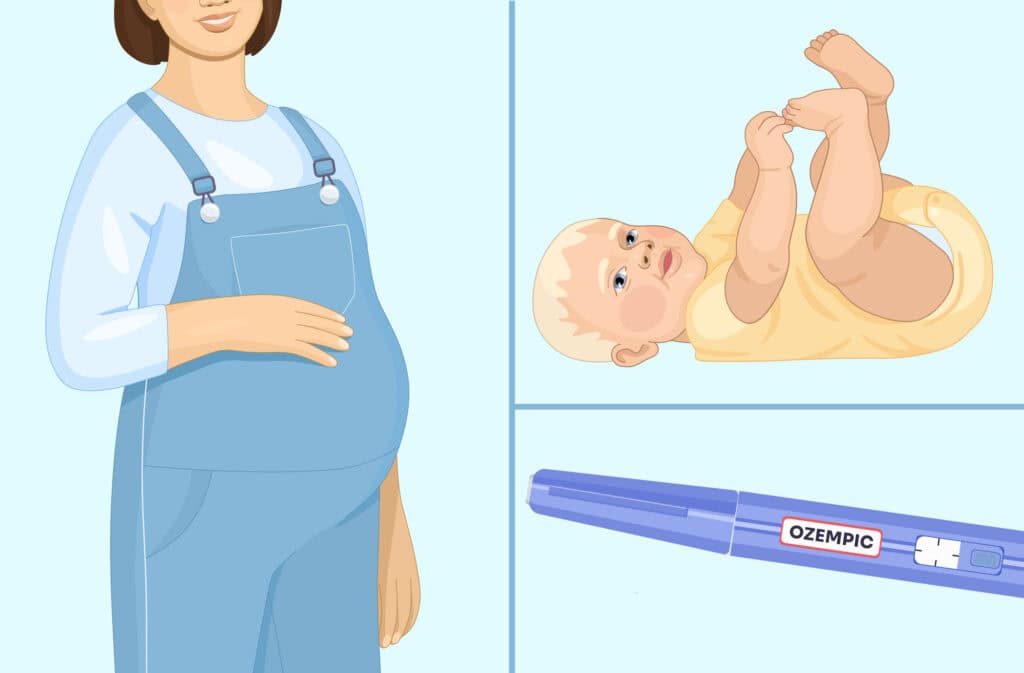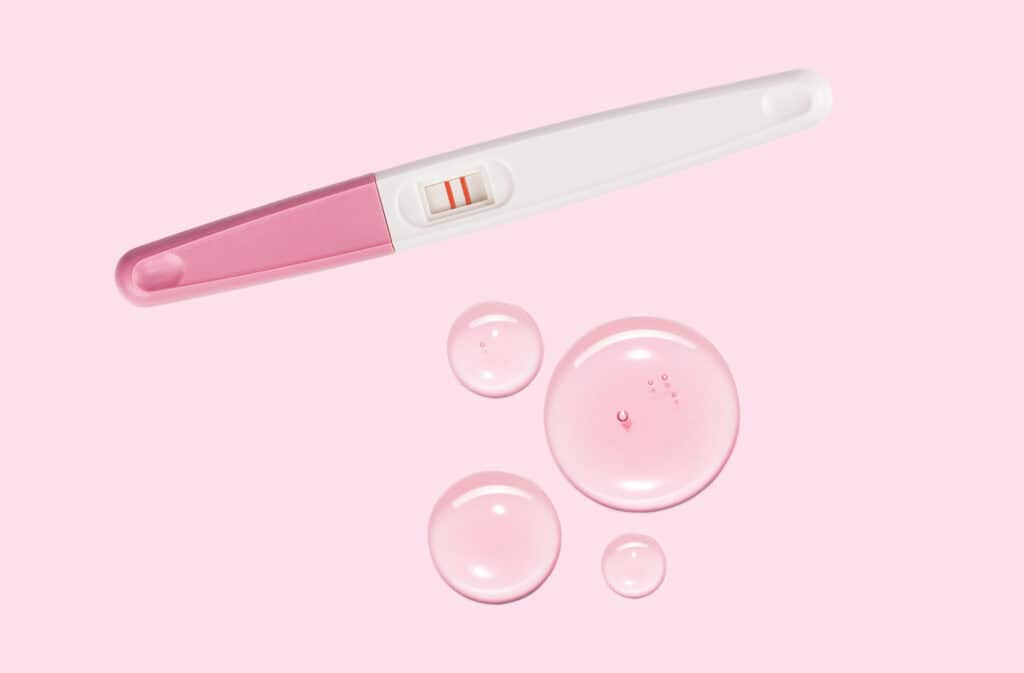Femia > Health Library > Pregnancy > Pregnancy week by week > 38 Weeks pregnant: Labor readiness & emotional support
38 Weeks pregnant: Labor readiness & emotional support

- Updated Feb 14, 2025
- Published
CRAFTED BY HUMAN
Crafted by human At Femia, we provide accurate and up-to-date information at every stage of your journey, from trying to conceive, pregnancy and postnatal support. All content is created by a real person based on in-depth research and own professional experience. Femia ensures that you will receive expert advice, strict accuracy and a personalized approach from our authors/medical experts. Learn more about our editorial policy.
FACT CHECKED
Fact checked At Femia Health, we maintain the highest standards of editorial excellence in delivering content focused on helping you conceive, guiding you through pregnancy, and supporting you postpartum. Explore our content review principles to learn how we ensure the accuracy and quality of our health and lifestyle tips for every stage of your journey.

Created with Hector Chapa, MD, FACOG, Clinical associate professor, Obstetrics and Gynecology Texas A&M University, College of Medicine in Bryan-College Station, USA
At 38 weeks pregnant, your baby is ready to arrive, and your body is showing signs of labor. You are still not considered full-term, however, which is from 39 weeks and 0 days to 40 weeks and 6 days. Your little one is ready for life outside the womb, weighing around 3 kilograms (6.6 pounds) and measuring about 19-20 inches long. Stay alert to symptoms like white discharge, losing your mucus plug, or consistent contractions.
You’re now 38 weeks pregnant—officially in the home stretch! This week, it’s all about recognizing labor signs, managing late pregnancy symptoms, and preparing mentally for delivery. Let’s dive into what to expect during week 38 of pregnancy.
Let Femia guide you through with personalized tips and expert advice
tailored to your pregnancy journey
Pregnant symptoms at 38 weeks
Here are common symptoms you may experience at 38 weeks:
Swollen ankles
Swelling in your feet and ankles is common, especially in the last few weeks of pregnancy. While some swelling is normal, call your doctor immediately if you experience sudden or excessive swelling, particularly in the face or hands, as this could be a sign of preeclampsia.
Trouble sleeping
Difficulty sleeping is common in the final stages of pregnancy, often due to physical discomfort and anxiety about labor. To improve sleep quality, maintain good sleep hygiene, avoid heavy meals and caffeine before bed, and try relaxing activities like reading or meditating.
Crazy dreams
Intense dreams, including vivid or anxiety-inducing ones, are common during pregnancy due to hormonal fluctuations. These dreams often reflect your subconscious worries or thoughts about labor and parenthood.
Lightning crotch
Sharp, sudden pain in your pelvis or groin, known as lightning crotch, is a common and harmless symptom in late pregnancy. It usually lasts only a few seconds and occurs when the baby’s head presses on the cervix or lower uterus.
Vaginal discharge
You may notice increased vaginal discharge as you approach labor, including changes in color or texture. If the discharge is clear, white, or creamy, it’s typically normal. However, contact your provider if you experience bleeding or any discharge with an unpleasant odor.
Heartburn
Heartburn may intensify in late pregnancy due to the growing uterus putting pressure on your stomach. To ease symptoms, eat smaller meals more frequently, avoid trigger foods, and sleep with your upper body elevated to prevent acid reflux.
Gas and bloating
With your baby taking up more space, gas and bloating are common. Avoid foods that trigger gas and try gentle exercises or walks to relieve discomfort.
Back pain
Lower back pain is a common complaint, especially as your growing belly shifts your center of gravity. Use a maternity belt or support pillow to help alleviate the strain on your back and improve comfort.
👉Find out more: 37 Weeks pregnant: Labor signs, baby development, and discomfort relief
Symptoms not to ignore at 38 weeks
Regular, painful contractions
Painful, regular contractions can indicate the start of active labor. If contractions are coming at regular intervals, lasting for about 60 seconds each, and getting stronger over time, this is likely the beginning of labor. If you’re unsure whether you’re in labor, time your contractions and call your healthcare provider to discuss the pattern and intensity.
Heavy bleeding
Bright red bleeding during late pregnancy is not normal and requires immediate medical attention. Heavy bleeding could signal complications such as placental abruption (where the placenta separates from the uterine wall) or placenta previa. Both conditions can be dangerous for both you and your baby, and require urgent medical intervention.
Sudden decrease in baby movements
A sudden decrease in your baby’s movements can be a sign of fetal distress. Babies should continue to move regularly, even if the movements are less pronounced. If you notice that your baby isn’t moving as much as usual or if movements stop entirely, contact your doctor or midwife immediately. They may ask you to do a kick count or come in for monitoring to ensure your baby is okay.
Severe headaches or blurred vision
Severe headaches or changes in your vision, including blurred vision or seeing spots, could be signs of preeclampsia, a pregnancy-related condition characterized by high blood pressure. Pre-eclampsia can lead to serious complications for both mother and baby, including organ damage or premature birth, so it’s crucial to contact your healthcare provider immediately if you experience these symptoms.
Watery vaginal discharge
If you notice a sudden gush or continuous trickle of clear, watery discharge, it could mean your water has broken. While it can happen before labor officially starts, it’s important to contact your healthcare provider right away. If your water breaks early, you may need to go to the hospital to assess the risk of infection or premature birth.
Your body at 38 weeks pregnant
At 38 weeks, your body is nearing the final stages of preparation for labor, and you may feel a variety of physical changes. As your baby moves lower into your pelvis, you may experience increased pressure in the pelvic area. This can make walking, sitting, or even standing for long periods of time feel uncomfortable. Additionally, your uterus continues to expand, which may cause discomfort as it presses against your organs, increasing the feeling of heaviness and strain.
You may also notice more frequent Braxton Hicks contractions, which are irregular, practice contractions that help your body prepare for the actual labor. These contractions are usually painless but can be uncomfortable, especially if you’re dehydrated or have been physically active. It’s important to stay hydrated, rest when needed, and avoid overexerting yourself. Fatigue is common at this stage, and it’s normal to feel more tired as your body works harder to support the growth and development of your baby.
Is 38 weeks full term?
Yes, 38 weeks is one week away from being a full-term, meaning your baby is developed enough to thrive outside the womb. However, every pregnancy is different, and your provider will monitor your readiness for delivery.
38 Weeks pregnant belly
Your belly may feel heavier and tighter, with your baby likely positioned head-down. Many women experience “lightening,” where the baby settles lower into the pelvis, easing pressure on the diaphragm but increasing pelvic discomfort.
Baby development at 38 weeks
At 38 weeks, your baby is continuing to fine-tune the critical survival skills needed after birth. They are practicing essential functions such as breathing, sucking, and blinking, which are necessary for adapting to life outside the womb. Additionally, your baby is accumulating fat under the skin to help regulate body temperature once born.
Baby at 38 weeks
- Weight: About 3 kilograms (6.6 pounds).
- Length: Your baby is around 19-20 inches long, roughly the size of a leek.
- Movements: As your baby grows and space becomes more limited, you’ll feel fewer sharp kicks but more stretching and rolling movements. They may also be turning their head from side to side, getting ready for the big day.
By this stage, your baby’s organs are fully developed, and they are now focused on gaining the last bit of weight and fine-tuning their reflexes, like grasping and sucking. The practice of breathing movements is helping to strengthen their lungs, preparing them for life outside the womb.
38-Week ultrasound
A 38-week ultrasound may be performed to confirm your baby’s position, check amniotic fluid levels, and assess overall growth. If you’ve lost your mucus plug or are showing signs of labor, this scan can help evaluate readiness for delivery.
Let Femia guide you through with personalized tips and expert advice
tailored to your pregnancy journey
Signs of labor at 38 weeks
It’s crucial to recognize the signs that labor is approaching:
- Losing your mucus plug: A thick, jelly-like discharge with blood streaks is a sign your cervix is dilating.
- Regular, painful contractions: These contractions occur at consistent intervals and intensify over time.
- Water breaking: A sudden gush or slow trickle of fluid indicates your amniotic sac has ruptured.
- Increased pelvic pressure: A sensation of heaviness as your baby moves lower into the pelvis.
If you’re unsure whether labor has started, contact your healthcare provider for guidance.
👉Find out more:
39 Weeks pregnant: Discharge, spotting & birth readiness
40 Weeks pregnant: Full-term baby, symptoms, and delivery prep
Health tips and self-care at 38 weeks pregnant
Hydrate regularly
Staying hydrated is essential for your well-being at this stage. Drinking plenty of water helps reduce swelling, supports digestion, and aids in the production of amniotic fluid. Aim for 8-12 glasses of water daily. Avoid caffeinated or sugary beverages that can lead to dehydration.
Take frequent breaks and rest
At 38 weeks, your body is working overtime, and fatigue is common. Take breaks throughout the day, especially if you’re on your feet a lot. Elevating your feet can help reduce swelling in your lower legs and feet. Make sure to rest when possible, as your body needs energy for the final push towards labor.
Learn how to relieve pain during labor
As labor approaches, it’s helpful to prepare for pain management. Consider learning techniques like controlled breathing, relaxation exercises, or visualizations that can help manage pain naturally. Some women find comfort in using water, such as taking warm baths or using a birthing pool. Talk with your healthcare provider about pain relief options, including epidurals or medications, and decide what will work best for you.
Prepare for baby feeding
It’s important to start thinking about how you want to feed your baby. Whether you’re planning to breastfeed or formula feed, consider reading about both options to make an informed decision. Stock up on the necessary supplies, such as nursing pads, a breast pump (if you plan to express milk), or baby bottles and formula. If you’re breastfeeding, attend a lactation consultation to get tips on proper latch techniques and to troubleshoot any concerns.
Track baby movements
Monitor your baby’s movements daily. Your baby should still be active at this stage, and a significant decrease in activity could indicate a problem. If you notice reduced movement, contact your healthcare provider immediately.
Prepare for labor and delivery
Review your birth plan with your provider and make sure you’re clear about what to expect during labor and delivery. Have your hospital bag packed and ready. Include essentials like your ID, insurance details, comfy clothes, toiletries, and anything else that will help make your stay more comfortable. Don’t forget to have a plan for getting to the hospital or birth center when the time comes.
Practice relaxation techniques
As you approach labor, it’s important to relax and reduce stress. Try deep breathing exercises, prenatal yoga, or gentle stretching to relieve tension in your body. A calm mind will help you feel more in control and prepared for the birth process.
Questions from the Femia community
How to mentally prepare for labor?
Mental preparation is key to a smoother labor experience. Practice relaxation techniques like deep breathing or visualization, which can reduce stress and increase confidence. Talk to your provider about what to expect during labor and delivery, and create a flexible birth plan. Sharing concerns with your partner or support person can also ease anxiety.
Does sex induce labor?
While sex is safe during late pregnancy for most women, its ability to induce labor is not scientifically proven. Semen contains prostaglandins, which may help soften the cervix, and orgasms can cause uterine contractions. However, consult your provider before trying sex to induce labor, especially if you have pregnancy complications.
How can I relieve constant pelvic pain?
Pelvic pain can be eased by using a maternity support belt, doing gentle stretches, or sitting on an exercise ball to relieve pressure. Avoid standing for long periods, and rest with your feet elevated whenever possible.
How likely am I to go into labor at 38 weeks?
At 38 weeks, you're considered full-term, so labor could begin at any time. Many women go into labor around this time, but it's not guaranteed. It's normal to feel signs like pelvic pressure or Braxton Hicks contractions, but true labor signs will be more consistent.
Does pelvic pressure mean labor is coming?
Pelvic pressure can be a sign that your baby is descending lower into the pelvis in preparation for labor. However, it doesn't necessarily mean labor is imminent. It can happen weeks before labor begins, though it may also indicate that labor is approaching. If the pressure is accompanied by other signs like regular contractions, it could be a sign that labor is near.
The bottom line
At 38 weeks pregnant, your baby is considered near full-term and could arrive at any moment. They are fully developed, gaining fat to regulate body temperature, and practicing skills like breathing and sucking in preparation for life outside the womb. While your body shows signs of nearing labor, such as pelvic pressure, back pain, and increased discharge, it’s essential to stay alert to labor indicators like regular contractions, water breaking, or losing your mucus plug.
Some women may still feel no signs of labor at this stage, which is perfectly normal. Use this time to finalize your birth plan, pack your hospital bag, and discuss any questions or concerns with your healthcare provider. Managing late-pregnancy discomfort, such as lower back pain or nausea, through gentle activity and relaxation techniques can help you stay calm and prepared. The finish line is in sight, and your baby will be here soon.
References
- “38 Weeks Pregnant: Symptoms, Baby Development & Tips.” BabyCenter, www.babycenter.com/pregnancy/week-by-week/38-weeks-pregnant.
- “Week 38 of Pregnancy: Symptoms, Baby Development & More.” What to Expect, www.whattoexpect.com/pregnancy/week-by-week/week-38.aspx.
- “38 Weeks Pregnant: Baby Development, Symptoms & Tips.” NHS, www.nhs.uk/pregnancy/week-by-week/1-to-12/38-weeks/.
- “Pregnancy Week 38: What to Expect.” American Pregnancy Association, www.americanpregnancy.org/healthy-pregnancy/week-by-week/38-weeks-pregnant/.
- American College of Obstetricians and Gynecologists. “Definition of Term Pregnancy.” Committee Opinion No. 579, Nov. 2013, www.acog.org/clinical/clinical-guidance/committee-opinion/articles/2013/11/definition-of-term-pregnancy. Accessed 26 Nov. 2024.

Discover how Ozempic affects fertility and pregnancy. Learn about ‘Ozempic babies’, potential risks, and alternatives for managing weight while trying to conceive.

Discover the possibilities of getting pregnant from precum during ovulation. Understand the factors influencing conception and how to reduce risks with reliable contraception.

Discover 7 natural ways to boost fertility in women. Learn about diet, lifestyle changes, and timing intercourse. Expert tips to increase your chances of getting pregnant.
